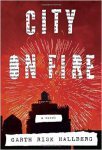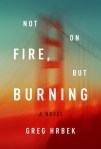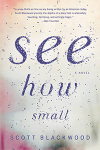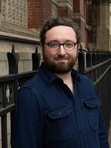Adam Morgan's Blog
February 18, 2022
2022 Chicago Books: An Incomplete List
I didn’t have time to make this pretty (and I pasted publicity copy instead of writing them up myself), but here’s an incomplete list of 2022 books about Chicago and/or by Chicagoans, including fiction, nonfiction, and poetry. It’s based on an Edelweiss search I ran in February, so more books will be added in the coming months, particularly for the back half of the year. Also, some small presses don’t use Edelweiss at all, and some presses fail to mention Chicago in the summary or contributor bio.
More Than Meat and Raiment by Angela Jackson (Northwestern University Press, January 15). “Angela Jackson returns with a poetic collage that draws on imagery from the African American South and the South Side of Chicago, storytelling, the Black Arts Movement, and Hausa folklore.”
Puerto Rican Chicago: Schooling the City, 1940-1977 by Mirelsie Velazquez (University of Illinois Press, January 22). “The postwar migration of Puerto Rican men and women to Chicago brought thousands of their children into city schools. Mirelsie Velázquez tells how Chicago’s Puerto Ricans pursued their educational needs in a society that constantly reminded them of their status as second-class citizens.”
Respect the Mic: Celebrating 20 Years of Poetry from a Chicagoland High School, edited by Peter Kahn, Hanif Abdurraqib, Dan “Sully” Sullivan, Franny Choi (Penguin Workshop, February 1). “An expansive, moving poetry anthology, representing 20 years of poetry from students and alumni of Chicago’s Oak Park River Forest High School Spoken Word Club.”
Making Mexican Chicago: From Postwar Settlement to the Age of Gentrification by Mike Amezcua (University of Chicago Press, February 22). “Though Chicago is often popularly defined by its Polish, Black, and Irish populations, Cook County is home to the third-largest Mexican-American population in the United States. In Making Mexican Chicago, Mike Amezcua explores how the Windy City became a Latinx metropolis in the second half of the twentieth century.”
Woman on Fire by Lisa Barr (Harper, March 1). “After talking her way into a job with Dan Mansfield, the leading investigative reporter in Chicago, rising young journalist Jules Roth is given an unusual—and very secret—assignment. Dan needs her to locate a painting stolen by the Nazis more than 75 years earlier: legendary Expressionist artist Ernst Engel’s most famous work, Woman on Fire.”
The Myth of Surrender by Kelly O’Connor McNees (Pegasus Books, March 1). “Written by the acclaimed author of The Lost Summer of Louisa May Alcott and Undiscovered Country, The Myth of Surrender explores a hidden chapter of American history that still reverberates across the lives of millions of women and their children.”
The Billboard by Natalie Y. Moore (Haymarket Books, March 8). “The Billboard is about a fictional Black women’s clinic in Chicago’s Englewood neighborhood on the South Side and its fight with a local gadfly running for City Council who puts up a provocative billboard.”
Don’t Get Close by Matt Miksa (Crooked Lane, March 8). “An infamous reincarnation cult resurfaces in the wake of a deadly bombing, and it’s up to an FBI novice to learn its true aim—and uncover its dark past before it consumes her.”
All Roads by Colleen O’Brien (Northwestern University Press, March 15). “Set mostly in Chicago, the stories range from the perspective of a nine-year-old girl intensely observing her new stepmother to a woman trying to make sense of her body after cancer surgery.”
The Emergency: A Year of Healing and Heartbreak in a Chicago ER by Thomas Fisher (One World, March 22). “The riveting, pulse-pounding story of a year in the life of an emergency room doctor trying to steer his patients and colleagues through a crushing pandemic and a violent summer, amidst a healthcare system that seems determined to leave them behind.”
Uninsured in Chicago: How the Social Safety Net Leaves Latinos Behind by Robert Vargas (NYU Press, March 22). “More than a decade after the passage of the Affordable Care Act, around eleven million Latinx citizens around the country remain uninsured. In Uninsured in Chicago, Robert Vargas explores the roots of this crisis, showing us why, despite their eligibility, Latinx people are the racial group least likely to enroll in health insurance.”
Murder Among Friends: How Leopold and Loeb Tried to Commit the Perfect Crime by Candace Fleming (Anne Schwartz Books, March 29). “How did two teenagers brutally murder an innocent child…and why? And how did their brilliant lawyer save them from the death penalty in 1920s Chicago?”
In Praise of Good Bookstores by Jeff Deutsch (Princeton University Press, April 5). “From a devoted reader and lifelong bookseller, an eloquent and charming reflection on the singular importance of bookstores.”
Her Word Is Bond: Navigating Hip Hop and Relationships in a Culture of Misogyny by Cristalle “Psalm One” Bowen (Haymarket Books, April 26). “Psalm One tells her own story, from growing up in Englewood, Chicago through her life as a chemist, teacher, and legendary rapper. Intrinsically feminist, this story is a celebration of the life and career of one artist who blazed the trail for women in hip hop.”
Marrying the Ketchups by Jennifer Close (Knopf, April 26). “An irresistible comedy of manners about three generations of a Chicago restaurant family and the deep-fried, beer-battered, cream cheese-frosted love that feeds them all.”
A House for the Struggle: The Black Press and the Built Environment in Chicago by E. James West (University of Illinois Press, April 26). “Buildings once symbolized Chicago’s place as the business capital of Black America and a thriving hub for Black media. In this groundbreaking work, E. James West examines the city’s Black press through its relationship with the built environment.”
Overboard by Sara Paretsky (William Morrow, May 10). “Legendary detective V.I. Warshawski uncovers a nefarious conspiracy preying on Chicago’s weak and vulnerable.”
Growing Up Chicago edited by David Schaafsma, Lauren DeJulio Bell and Roxanne Pilat (Northwestern University Press, May 15). “A collection of coming-of-age stories that reflects the diversity of the city and its metropolitan area. Primarily memoir, the book collects work by writers who spent their formative years in the region to ask: What characterizes a Chicago author? Is it a certain feel to the writer’s language? A narrative sensibility? The mention of certain neighborhoods or locales?”
Charlie Murphy: The Iconoclastic Showman behind the Chicago Cubs by Jason Cannon (University of Nebraska Press, June 1). “You don’t know the history of the Chicago Cubs until you know the story of Charles Webb Murphy, the ebullient and mercurial owner of this historic franchise from 1905 through 1914.”
Last Summer on State Street by Toya Wolfe (William Morrow, June 7). “For fans of Jacqueline Woodson and Brit Bennett, a striking coming-of-age debut about friendship, community, and resilience, set in the housing projects of Chicago during one life-changing summer.”
I Can Take it from Here: A Memoir of Trauma, Prison, and Self-Empowerment by Lisa Forbes (Truth to Power, June 7). “An emotional, page-turning account of unhealed trauma and personal transformation that will break your heart and change your mind, in the tradition of Somebody’s Daughter, A Piece of Cake, and Jesmyn Ward’s Men We Reaped.”
The Tomorrow Game: Rival Teenagers, Their Race for a Gun, and a Community United to Save Them by Sudhir Venkatesh (Simon & Schuster, June 28). “In the tradition of works like Random Family and Behind the Beautiful Forevers, Sudhir Venkatesh’s The Tomorrow Game is a deeply reported chronicle of families surviving in a Southside Chicago community.”
Look Closer by David Ellis (G.P. Putnam’s Sons, July 5). “Simon and Vicky couldn’t seem more normal: a wealthy Chicago couple, he a respected law professor, she an advocate for domestic violence victims. A stable, if unexciting marriage. But one thing’s for sure … absolutely nothing is what it seems. The pair are far from normal, and one of them just may be a killer.”
Peril at the Exposition by Nev March (Minotaur Books, July 12). “Captain Jim Agnihotri and his new bride, Diana Framji, return in Nev March’s Peril at the Exposition, the follow up to March’s award-winning, Edgar finalist debut, Murder in Old Bombay.”
Our Kind of Historian: The Work and Activism of Lerone Bennett Jr. by E. James West (University of Massachusetts Press, July 29). “Rooted in his role as senior editor of Ebony magazine, but stretching far beyond the boundaries of the Johnson Publishing headquarters in Chicago, Bennett’s work and activism positioned him as a prominent advocate for Black America and a scholar whose writing reached an unparalleled number of African American readers.”
Book of Extraordinary Tragedies by Joe Meno (Akashic Books, August 6). “Aleksandar and Isobel are siblings and former classical music prodigies, once destined for greatness. As the only Eastern European family growing up on their block on the far southside of Chicago, the pair were inseparable until each was forced to confront the absurdity of tragedy at an early age: Aleks lives with hearing loss, while Isobel struggles with preposterous expectations from herself and her family.”
Mount Chicago by Adam Levin (Doubleday, August 9). “A one-in-ten-billion natural disaster devastates Chicago. A Jewish comedian, his most devoted fan, and the city’s mayor must struggle to move forward while the world—quite literally—caves beneath their feet. With this polyphonic tale of Chicago-style politics and political correctness, stand-up comedy and Jewish identity, celebrity, drugs, and animal psychology, Levin has constructed a monument to laughter, love, art, and resilience in an age of spectacular loss.”
Sound Experiments: The Music of the AACM by Paul Steinbeck (University of Chicago Press, August 12). “Founded on Chicago’s South Side in 1965 and still thriving today, the Association for the Advancement of Creative Musicians (AACM) is the most influential collective organization in jazz and experimental music. In Sound Experiments, Paul Steinbeck offers an in-depth historical and musical investigation of the collective, analyzing individual performances and formal innovations in captivating detail.”
Even Though I Knew the End by C. L. Polk (Tor.com Publishing, November 8). “An exiled augur who sold her soul to save her brother’s life is offered one last job before eternity in hell. When she turns it down, her client sweetens the pot by offering up the one payment she can’t resist—the chance to have a future where she grows old with the woman she loves. To succeed, she must track down the White City Vampire, Chicago’s most notorious serial killer, in the three days she has left. If she fails, only hell and heartbreak await.”
February 15, 2022
72 Publications That Pay Freelancers for Book Reviews, Interviews, and More
Book reviews aren’t as ubiquitous as they used to be, but as of 2022, at least 72 publications still pay freelance writers for book reviews and author interviews.
To build this exhaustive list as a free community resource, I collaborated with the wonderful Chelsea Leu to create a more detailed version for the National Book Critics Circle, including points of contact and some nonpaying outlets. Visit their page [here] (link forthcoming).
For this abridged version, I’ve just included rates and links to submission guidelines (where available). Rates vary wildly from $15 to more than $1,000, depending on the outlet and the assignment. Another great resource is Who Pays Writers, and here’s an old thread of mine on how to pitch book reviews. Note that while the rates are accurate at publication, editorial budgets change all the time.
If you see any omissions or mistakes in the list below, feel free to contact me at adam[at]adam-stephen-morgan.com, just keep in mind that this version of the list is only for outlets that pay freelancers.
4 Columns – Book reviews (how to pitch)
The Adroit Journal – Book reviews and interviews (how to pitch)
Air Mail – Book reviews, interviews, and features
AGNI – Book reviews ($20 per printed-out page, how to pitch)
Asymptote – Book reviews and interviews (how to pitch)
The Atlanta Journal Constitution – Book reviews (~$250)
The Atlantic – Book features (how to pitch)
The AV Club – Book reviews and features ($75)
The Baffler – Criticism and essays ($250+, how to pitch)
Black Femme Collective – Book reviews ($150-$300, how to pitch)
BOMB – Book reviews and interviews ($150 for web interviews)
Bookforum – Book reviews, interviews, profiles, and features (how to pitch)
Booklist – Capsule book reviews ($15, how to pitch)
BookMarks – Book review…overviews? ($35-$800, how to pitch)
BookPage – Book reviews and author interviews
Borderlore – Book interviews, features, essays
The Boston Globe – Book reviews ($450, send pitches to contributing editor Kate Tuttle, kate.tuttle[at]globe.com)
The Brooklyn Rail – Book reviews and interviews ($75, how to pitch)
Buzzfeed Books – Book features and interviews
The Chicago Reader – Chicago-based book reviews and profiles (how to pitch)
The Chicago Review of Books – Book reviews, interviews, and features ($25, how to pitch)
The Chicago Tribune – Book reviews
The Christian Science Monitor – Book reviews and interviews ($200)
Electric Literature – Book related essays ($100, how to pitch)
Esquire – Book features and interviews (send pitches to assistant editor Adrienne Westenfeld, awestenfeld[at]hearst.com)
Event mag – Book reviews
Foreword Reviews – Book reviews and interviews
Guardian (The) – Book reviews and interviews
Houston Chronicle – Book reviews
In These Times – Book reviews ($0.25 per word, pitch Sherell Barbee at sherell.inthesetimes[at]gmail.com)
Jewish Currents – Book features and essays
Kirkus Reviews – Capsule book reviews and interviews ($50 for reviews)
LIBER: Feminist Review – Book reviews and features ($100 for reviews, $500 for features, how to pitch)
Literary Hub – Book features and essays (how to pitch)
London Review of Books – Book reviews, essays, and features (how to pitch)
Los Angeles Review of Books – Book reviews, interviews, and essays ($50-$100, how to pitch)
Los Angeles Times – Book reviews and features ($400)
Lux – Book essays ($0.50 per word, pitches[at]lux-magazine.com)
The Markaz Review – Book essays ($120)
Millions (The) – Book reviews, interviews, and features (how to pitch)
Mother Jones – Book features
Nation (The) – Book features ($950-$1250)
New Criterion (The) – Book essays ($100)
New Republic – Book reviews ($500-$2,000 for print, $250-$400 for web)
New York Review of Books – Book reviews and essays
New York Times Book Review – Book reviews, interviews, and features
New Yorker (The) – Book reviews and essays ($0.75 per word for web)
Newsday – Book reviews and interviews
NPR – Book reviews ($300 for fiction)
O, The Oprah Magazine – Book reviews, interviews, and features ($2 per word)
Observer (The) – Book reviews and interviews (pitch Erin Taylor at etaylor[at]observer.com)
Orion Magazine – Longform book reviews ($1,000)
Paris Review (The) – Book essays for The Daily (how to pitch)
Paste Magazine – Book interviews and features ($100, who to pitch)
Pittsburgh Post Gazette – Book reviews
Ploughshares – Book reviews and interviews ($25, how to pitch)
Publishers Weekly – Capsule book reviews ($25-$50)
Puritan (The) – Book reviews ($100, how to pitch)
Reason – Book reviews ($500)
The Rumpus – Book reviews and interviews (pays small honorarium, how to pitch 1 and 2)
San Francisco Chronicle – Book reviews ($165)
SFWA – Book reviews ($0.10 per word, how to pitch)
Shondaland – Book interviews and features (how to pitch)
Slate – Book essays ($300-$500, how to pitch)
St. Louis Post-Dispatch – Book reviews ($85+)
Star Tribune (Minneapolis) – Book reviews ($150)
Tampa Bay Times – Book reviews ($150)
Times Literary Supplement – Book reviews and essays (how to pitch)
USA Today – Book reviews ($300)
Wall Street Journal – Book reviews ($400-$1,000)
Washington Independent Review of Books – Book reviews ($25, how to pitch)
Washington Post – Book reviews
Words Without Borders – Book reviews and interviews ($100)
January 11, 2021
2021 Chicago Books: An Incomplete List
I didn’t have time to write these up or make them pretty, but here’s an incomplete list of 2021 books about Chicago and/or by Chicagoans. It’s based on an Edelweiss search I ran in January, so more books will be added in the coming months, particularly for the back half of the year, and some small presses don’t use Edelweiss at all (or fail to mention Chicago in the summary or contributor bio). I did manage to add purchase/preorder links!
W-3 by Bette Howland, A Public Space Books, January 12
Useless Miracle by Barry Schechter, Melville House, January 12
The Loop : Chicago Architecture and the Social Imaginary by Kai Horstmannshoff, Columbia University Press, January 30
The Kindest Lie by Nancy Johnson, William Morrow, February 2
Halfway Home: Race, Punishment, and the Afterlife of Mass Incarceration by Reuben Jonathan Miller, Little, Brown and Company, February 2
Love Is an Ex-Country by Randa Jarrar, Catapult, February 2
Doppelgangbanger by Cortney Lamar Charleston, Haymarket Books, February 9
Perfect Example by John Porcellino, Drawn & Quarterly, February 9
The Upstairs House by Julia Fine, Harper Books, February 21
In the Shadow of the Ivory Tower: How Universities Are Plundering Our Cities by Davarian L Baldwin, Bold Type, March 30
Never Come Morning by Nelson Algren, Seven Stories Press, April 6
Blow Your House Down: A Story of Family, Feminism, and Treason by Gina Frangello, Counterpoint Press, April 6
Making the Second Ghetto: Race and Housing in Chicago, 1940-1960 by Arnold R. Hirsch, University of Chicago Press, April 6
Local Woman Missing by Mary Kubica, Park Row, May 18
Model Cases: On Canonical Research Objects and Sites by Monika Krause, University of Chicago Press, June 7
Darling by K. Ancrum, Imprint, June 22
Building a Better Chicago: Race and Community Resistance to Urban Redevelopment by Teresa Irene Gonzales, NYU Press, June 29
Leaving Breezy Street: A Memoir by Brenda Myers-Powell with April Reynolds, Henry Holt, June 29
The Lost Girls by Jessica Chiarella, G.P. Putnam’s Sons, July 6
The Case of the Murderous Dr. Cream: The Hunt for a Victorian Era Serial Killer by Dean Jobb, Algonquin Books, July 13
Makeshift Chicago Stages: A Century of Theater and Performance, edited by Stuart J. Hecht, Jasmine Jamillah Mahmoud, and Megan E. Geigner, Northwestern University Press, July 15
Her Word Is Bond: Navigating Hip Hop and Relationships in a Culture of Misogyny by Cristalle “Psalm One” Bowen, Haymarket Books, August 3
Clark and Division by Naomi Hirahara, Soho Press, August 3
Refugee High: Coming of Age in America by Elly Fishman, The New Press, August 10
December 26, 2020
About Me
Adam Morgan is the founding editor of the Chicago Review of Books and the Southern Review of Books. His essays and criticism have appeared in The Paris Review, Los Angeles Times, Chicago Tribune, Chicago magazine, The AV Club, The Guardian, Poets & Writers, Literary Hub, Longreads, Chicago Reader, Minneapolis Star-Tribune, and elsewhere. Here’s a list of selected works.
He has taught writing at the University of North Carolina, Charlotte, StoryStudio Chicago, and Roosevelt University, where he completed an MFA. In 2018, he was awarded the James Friend Memorial Award for Literary and Dramatic Criticism from the Society of Midland Authors, as well as a National City and Regional Magazine Award for “Best Online Column” for his work in Chicago magazine.
April 7, 2016
Nature and Humankind Collide in The Lightkeepers
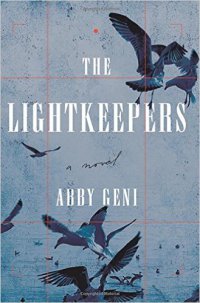
Originally published at the Chicago Review of Books.
The Islands of the Dead—“bare, bald, and broken”—are ripe with mystery, musk, and blood in Abbi Geni‘s debut novel, The Lightkeepers. A small but harsh wilderness, the islands are home to great white sharks, whales, seals, birds, mice, and six eccentric biologists living beneath a 150-year-old lighthouse.
When a nature photographer, Miranda, arrives for a year-long stint to capture the local wildlife, she’s stunned by the surreal nature of the place. “I am half-convinced the islands are not rooted at all,” she says, “but move around whenever my back is turned, taking up brand-new positions elsewhere.”
The Lightkeepers is similarly chimeric, constantly shifting from mystery to travelogue to natural horror and beyond. For the first one hundred pages, Geni is content to build tension and atmosphere through pure, distilled prose, forgoing any direct attempts to kickstart the plot. And then, violence. In the end, Geni’s transcendent novel is as merciless, strange, and coldly beautiful as the islands she describes.
Thanks to their otherworldly nature, it’s easy to think the Islands of the Dead a figment of Geni’s imagination. But the Farallon Islands are a very real archipelago thirty miles off the coast of San Francisco. “There were no sandy beaches. The shores were streaked with seaweed, the peaks fragmented and craggy,” Miranda says, and judging from Devil’s Teeth, a journalist’s real-life account of the islands in 2006, they are as inhospitable to human life as an alien planet.
Miranda is a bit of an island herself, unmoored from family or friends thanks to a nature photographer’s nomadic lifestyle. She exchanges postcards with her father, usually just one or two words. She writes letters to her mother—who never receives them, having died when Miranda was young. Miranda used to put them in the mail, addressed simply to “Mom,” but in recent years she’s gotten more creative. “While hiking in the mountains, I have folded my messages into origami flowers, hanging them in the trees.”

Sea stacks off the coast of Southeast Farallon Island, where most of The Lightkeepers takes place.
The Farallon Islands, however, are a crucible of human and animal intimacy. Miranda’s aloofness is challenged by the constant din of elephant seals and storm petrels, by the recurring violence of shark kills, and by the cramped, 19th-century living arrangements she shares with six scientists. Before long, her curiosity is spiked. The islands are soaked with secrets.
From the book’s back matter and other reviews, which use words like “murder mystery” and “ghost story,” it should come as no surprise that people die. But readers expecting a traditional representation of those genres will be disappointed. There is plenty of mystery, and perhaps a ghost, but The Lightkeepers contains neither the linear, streamlined plot of the former, nor the Victorian, squeaky-door antics of the latter.
Further, the ubiquitous comparisons to The Lovely Bones are misleading at best, lazy at worst, as was the case with Scott Blackwood’s See How Small last winter. There are no scenes in heaven or Hollywood endings. The Lightkeepers is a haunting, brutal, rain- and blood-soaked story of humans at the mercy of nature. Miranda doesn’t seek divine justice for the violence she endures, she seeks a deeper connection with the islands than she’s able to find among people. The same islands that are intent on killing her.
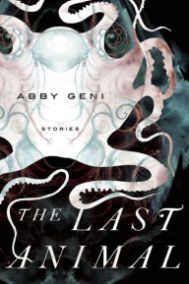 It’s not the first time Abby Geni—a graduate of the Iowa Writers’ Workshop who lives in Chicago and teaches at the School of the Art Institute—has explored the natural world through her fiction. Her debut collection of short stories in 2013, The Last Animal, also tackled the connections between humankind and the rest of the animal kingdom. Both books beg comparisons between human and animal intelligence, in our capacities for intellectual and emotional experience. Like the biologists in her stories, Geni’s fiction implies the differences may be in kind rather than degree.
It’s not the first time Abby Geni—a graduate of the Iowa Writers’ Workshop who lives in Chicago and teaches at the School of the Art Institute—has explored the natural world through her fiction. Her debut collection of short stories in 2013, The Last Animal, also tackled the connections between humankind and the rest of the animal kingdom. Both books beg comparisons between human and animal intelligence, in our capacities for intellectual and emotional experience. Like the biologists in her stories, Geni’s fiction implies the differences may be in kind rather than degree.
With The Lightkeepers, Geni joins the ranks of Barbara Kingsolver and Annie Proulx—novelists for whom nature is a driving narrative force instead of a backdrop. However, Geni’s debut is a few shades darker than Prodigal Summer or Close Range, and instead of Kingsolver and Proulx’s architectural prose, Geni writes in small, perfect sentences stripped of ornamentation, often single clauses. It’s a beautiful effect; pages pass quickly and effortlessly. By the novel’s end, you’ll crave another journey with Geni to some other wild, forgotten corner of the globe.
Note to our Chicago readers: To celebrate the release of The Lightkeepers, Abby Geni will be speaking and reading at several events in the Chicago area in February, March, and April.
FICTION
The Lightkeepers by Abbi Geni
Counterpoint Press
Published January 12, 2016
ISBN 9781619026001


January 14, 2016
You’ll Never Want to Leave: TRAVELERS REST by Keith Lee Morris
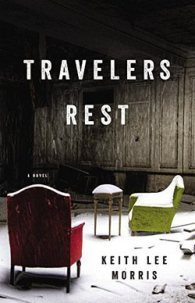 Originally published in
Bookpage
.
Originally published in
Bookpage
.
Time and space are fluid as water in Keith Lee Morris’ labyrinthine third novel, his first since 2008’s brutal The Dart League King. This time, a family road trip goes awry in the small town of Good Night, Idaho thanks to a hotel that rivals The Shining’s, a book with which Travelers Rest will inevitably be compared, though there are more definitive answers here.
The Addison family—mother, father, son, and alcoholic uncle—are driving from Seattle to South Carolina when a snowstorm forces them to look for lodging in Good Night. The eponymous hotel, Travelers Rest, was once a palatial second home for the town’s high society, but fell into disrepair when the local mines dried up decades ago. After checking into the hotel, the Addisons quickly become separated in ways that are hard to describe, thanks to the shifting nature of time, space, memory, and dream in Good Night. The town is a lot like that grand staircase in Hogwarts, always rearranging itself depending on who enters and what they want.
Tonio, the father, wanders outside in the snow and follows a strange woman in silver shoes. Julia, the mother, finds an oddly familiar room on the third floor with an open roof, where she’s content to lie down and dream. Robbie, the uncle fresh out of rehab, bolts for the bar across the street, where he can’t tell if it’s the booze or the town that’s playing tricks on him. And Dewey, Julia and Tonio’s 10-year-old son, searches for his family, glimpsing them from a distance from time to time, but never quite able to reach them.
If you feel lost after the first 100 pages (and you will), don’t worry. The story is worth your confusion. In fact, it requires it. Proustian in theme but not in form, Travelers Rest is the definition of dreamlike prose. Morris’ writing is clean and cold as snow. The pages drift by just as effortlessly, lulling you into a quiet cocoon that you realize, too late, is actually something much more sinister.
FICTION: LITERARY, MYSTERY, THRILLER
Travelers Rest by Keith Lee Morris, Little, Brown and Company


December 14, 2015
2015 Review Roundup
I wrote about a lot of books and plays this year (and interviewed a lot of authors). If you’re looking for some reading material over the holidays (or hoping to see a show in Chicago), here’s a categorical list of everything I covered in 2015.
BEST-OF LISTS
“Best Science Fiction and Fantasy of 2015” SF Signal, December 2015
“Best Chicago Novels by Neighborhood” Gapers Block, September 2015, featured on WGN Radio
BOOK REVIEWS
Ghostly, edited and illustrated by Audrey Niffenegger, Gapers Block, October 2015
Aurora by Kim Stanley Robinson, Strange Horizons, September 2015
The Killing Lessons by Saul Black, Bookpage, September 2015
Not on Fire, But Burning by Greg Hrbek, Bookpage, September 2015
Marvel and a Wonder by Joe Meno, Gapers Block, September 2015
Above the Waterfall by Ron Rash, Bookpage, September 2015
Little Pretty Things by Lori Rader-Day, Bookpage, July 2015
Time Salvager by Wesley Chu, Gapers Block, July 2015
Bell Weather by Dennis Mahoney, Bookpage, June 2015
The Watchmaker of Filigree Street by Natasha Pulley, Bookpage, June 2015
The Water Knife by Paolo Bacigalupi, Bookpage, June 2015
I, Ripper by Stephen Hunter, Bookpage, May 2015
The Harvest Man by Alex Grecian, Bookpage, May 2015
The Making of Zombie Wars by Aleksandar Hemon, Bookpage, May 2015
House of Echoes by Brendan Duffy, Bookpage, April 2015
The Fifth Heart by Dan Simmons, The Denver Post, April 2015
The Only Words That Are Worth Remembering by Jeffrey Rotter, Bookpage, April 2015
Cat Out of Hell by Lynne Truss, Bookpage, March 2015
See How Small by Scott Blackwood, Bookpage, January 2015
AUTHOR INTERVIEWS
Adam Morgan Chats with Sarah Lotz, Author of Day Four, SF Signal, June 2015
An Interview with Chicago Author Lori Rader-Day, Gapers Block, June 2015
An Interview with Saad Hossain, Bookslut, July 2015
Garth Risk Hallberg Came Up with City on Fire in 90 Seconds, Literary Hub, October 2015
Dominic A. Pacyga Talks About Slaughterhouse, Gapers Block, November 2015
Lynne Raimondo Talks About Her Third Chicago Crime Novel, Gapers Block, November 2015
PLAYS & COMEDY
“Steppenwolf Tackles Faith and Suffering in Grand Concourse” Gapers Block, July 2015
“The Second City’s Soul Brother Outshines Panic on Cloud 9″ Gapers Block, July 2015
“Steppenwolf’s East of Eden Misses the Forest for the Trees” Gapers Block, October 2015
“The Second City Tries Something Different with Fool Me Twice“ Gapers Block, December 2015
“Unlike Scrooge, Goodman’s A Christmas Carol Never Gets Old” Gapers Block, December 2015


December 11, 2015
Best Science Fiction and Fantasy Books of 2015
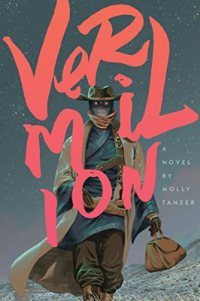 Over at the Hugo award-winning SF Signal, I listed my 13 favorite science fiction and fantasy novels of the year.
Over at the Hugo award-winning SF Signal, I listed my 13 favorite science fiction and fantasy novels of the year.
“2015 was a great year for speculative fiction. Plenty of household names (e.g., Kim Stanley Robinson, Neal Stephenson, Margaret Atwood, and David Mitchell) put out great books, and several relative newcomers established themselves as writers to watch. Perhaps most encouraging, however, is the abundance of diverse voices available in bookstores, online, and awards shortlists (minus the whole Hugo Awards fiasco). Science fiction and fantasy is undoubtedly more representative of the world population today than at any time in history, and that’s something to be excited about. Not just as a human being, but as a curious reader, too.”
Head over to SF Signal for the list, complete with previews.


October 22, 2015
Interview: Garth Risk Hallberg, Author of CITY ON FIRE
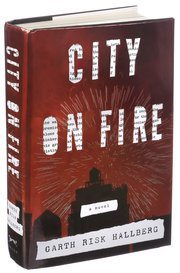 Originally published at Literary Hub.
Originally published at Literary Hub.
Garth Risk Hallberg’s debut novel—sold for $2 million in a 10-publisher bidding war—has been the most anticipated, hyped and ballyhooed book of 2015. If the literary gods are fair, it’ll wind up on many shortlists. But unless you’re a connoisseur of literary criticism, you’ve probably never heard of the author.
Hallberg grew up in the small college town of Greenville, North Carolina, where he was the “resident beatnik.” Until now, he’s had a quiet career as an award-winning book critic for The Millions and a writing professor at Sarah Lawrence College. That’s about to change with the arrival of his first novel.
City on Fire is a postmodern epic in the vein of Roberto Bolaño’s 2666. Beginning with a mysterious shooting in Central Park and culminating in the real-life New York City blackout of 1977, Hallberg weaves a complex story with an ensemble cast. The book’s seven parts are divided by and interspersed with letters, news clippings and images, similar in form to Marisha Pessl’s Night Film. City on Fire encapsulates the many cities that are somehow one New York City during its most dramatic moment in the 20th century.
I spoke with Hallberg about City on Fire, New York City, and how the book was inspired by September 11th.
Let’s start with the obvious: most debut novels aren’t 900 pages long. Did you set out to write something so sprawling in scope?
The scope of the book was very much a part of the initial conception. The whole idea came to me in a period of about 90 seconds in 2003, and one of the things I saw about the book was that it would have the scale and sweep of Bleak House. And that was almost scary for me, so after writing a single page of it, I shut the notebook and said, “Oh boy, I don’t have the chops to do something like that. I’ll come back to it in 10 years.” But I came back to it about four years later. It had been building in my subconscious until the world was fully formed, so when I sat down to write, it was like going through the wardrobe into Narnia.
You’ve already been compared to DeLillo, Franzen and David Foster Wallace. What does that feel like as a debut novelist?
It’s sort of like asking a fish how the water feels. You’re inside it, but not necessarily aware of what’s being said around you. If there’s one predominant feeling, it’s surprise.
I loved the book’s interludes with letters, news clippings and images. What made you decide to play around with those?
I had a dream in which I saw the finished book, and I was giving it to someone. And as I was flipping through it, I could see that some pages weren’t just pure type. So I woke up and thought, either that’s a crazy dream that I’ll just forget about, or there’s something to it, and I’ll figure it out down the road. But I had written this letter, and it started to revolve around a magazine article, and I knew I had to write it, and I knew where it went.
As a native of a small town, what drew you to New York?
I used to go up to New York with my friends as a teenager and just drive around, and it was completely intoxicating. New York was a place where everything that had been repressed or frowned upon or discouraged in the town I grew up in was given freedom of expression.
You’ve said New York seemed like a fantastical place when you were young. Why?
When I first started to read, New York was where all the books came from. Almost every book that I encountered as a kid was like a doorway to the wider world, and a world that I would return to the real world enriched by. Stuart Little, Harriet the Spy, Tales of a Fourth Grade Nothing, And to Think That I Saw It on Mulberry Street—in many of those books the world that you walk into is altered and exciting and transformed.
This might be a strange analogy, but your conception of the city reminds me of the “multiverse” in Marvel and DC Comics, with all these different continuities and realities that somehow coexist in the same city at the same time.
I think that’s a good analogy! In my experience, we actually live in a multiverse, but that’s so challenging to keep remembering. We’re constantly tempted to imagine that we live in a world that’s less complex, or that’s just about us.
Do you think the New York City of 2015 is a less magical place than it once was?
I’m hesitant to pontificate on what New York might be in general. After September 11th, there was this extraordinary feeling that everyone was still grieving. And for that reason, people seemed vulnerable and more open to change, in the same way people do at a bar after a funeral, this feeling that it would be a tribute to the people we lost to change your life for the better. But that feeling didn’t last. You can’t live inside that feeling forever. In 2015, it’s hard for me to say what New York means to anyone besides me.
I’ve heard you say that September 11th partially motivated your writing. What do you mean by that?
September 11th was seeing something I cared deeply about suddenly put in risk of not existing. I was just out of college, so it was my first initiation into life as an adult in America. Between then and 2003, there was a lot of ideological work going on in the culture, trying to say what September 11th really meant, and increasingly what people were saying was not what I knew to be true. So I think, subconsciously, I was looking for a way to talk about that period from September 2001 up until 2003, about what it meant for me.
This might be way too early, but what’s next for you?
Another writer asked me that a few months ago, and when I said I couldn’t answer, he said, “Good, if you were able to talk about it now, I’d think you were crazy.” So I’m among the healthy minority who won’t answer that question yet!
FICTION: LITERARY
City on Fire by Garth Risk Hallberg, Knopf


September 28, 2015
Glen Duncan’s Alter Ego: THE KILLING LESSONS by Saul Black
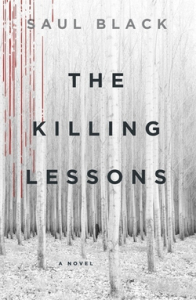 Originally published in Bookpage.
Originally published in Bookpage.
For nine months The Girl on the Train has been lauded as the best thriller of 2015, but it has some real competition with the arrival of The Killing Lessons, a dark, violent novel from British author Glen Duncan (The Last Werewolf) writing under the pseudonym Saul Black. Set in San Francisco and Colorado, it’s a cross-country race to catch two serial killers that channels the atmosphere of Scandinavia’s celebrated TV noirs with female heroes like “The Killing” (Forbrydelsen) and “The Bridge” (Broen).
Rowena Cooper is baking Christmas cookies for her children when two men appear in her home in the mountains of Colorado, one holding a shotgun, the other a knife. Though they murder Rowena and her son, her 10-year-old daughter Nell manages to escape into the woods. Meanwhile in San Francisco, a team of investigators has been hunting these murderers for months, after they abducted, raped and murdered seven women in different cities before transporting their bodies to another state. The men leave objects inside their victims as a signature—a balloon, a fork, a museum flier. Lead investigator Valerie Hart isn’t sure if they’re meaningful or random, but she’s not sure of anything anymore. Once driven and naive, Valerie has become jaded, resigned and dependent on a drink ever since she “killed love” in her own heart. Though Valerie soon makes a long overdue break in the case, the only person alive who can help her identify the serial killers is young Nell, still missing in the Colorado mountains, who may have escaped one grisly fate only to meet another.
Violent but never gratuitous, Duncan’s first crack at a thriller is a master class in suspense. Phrases like “page-turner” and “it kept me up all night!” get thrown around a lot in the book business, but The Killing Lessons is hands-down the most compelling, addictive novel I’ve read this year.
FICTION: SUSPENSE, THRILLER
The Killing Lessons by Saul Black (St. Martin’s Press)



